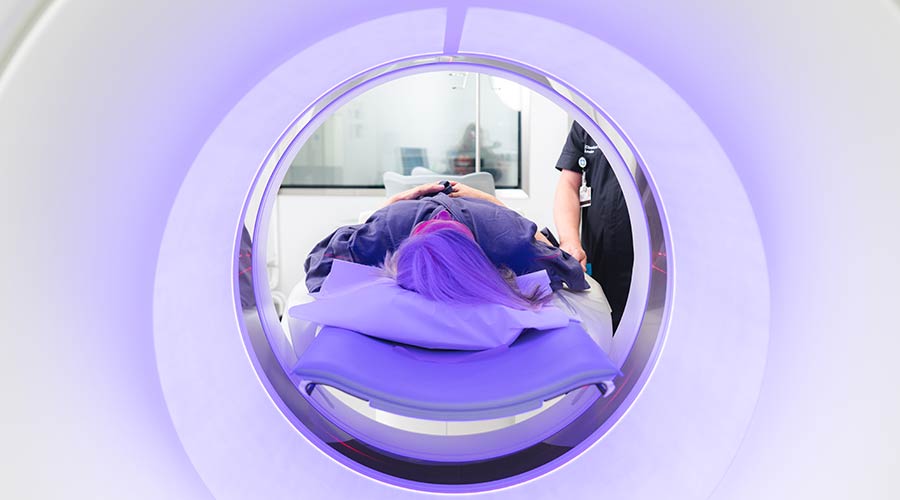
It can be devastating and difficult to cope when your loved one has not regained consciousness after brain injury or stroke — but you don’t have to go through this experience alone. At Cleveland Clinic London, our highly specialised team is dedicated to caring for people with prolonged disorders of consciousness (PDoC). We offer support, compassion and the expertise of the U.K.’s foremost PDoC clinicians.
Prolonged Disorders of Consciousness Programme: Why Choose Cleveland Clinic London?
Our unique PDoC programme offers:
- Specialised expertise: Our team includes rehabilitation medicine consultants and neurologist assessors who meet the standards for PDoC specialisation as outlined by the Royal College of Physicians. They have extensive training from the U.K.’s three designated PDoC units and offer a depth of expertise that is hard to find elsewhere.
- Care for complex conditions: Our teams of specialists can care for any condition your loved one may be experiencing. Neurologists, anaesthetists, radiologists, rehabilitation specialists and intensive care consultants work together to manage each patient’s medical needs, maximising recovery and comfort. Our 24/7 intensive care unit is available in the event of critical illnesses.
- All-private suites: People with disorders of consciousness require periods of active stimulation alternating with rest periods. Our all-private suites provide a calm, quiet environment that encourages recovery and healthy sleep-wake cycles. Our state-of-the-art facility also provides family members with amenities and the comforts of home.
What Are Disorders of Consciousness?
A disorder of consciousness is when a person is unconscious (not awake or aware) or semi-conscious. A DoC is usually the result of a traumatic brain injury, hypoxic brain injury (lack of oxygen to the brain), stroke or severe infection. A prolonged disorder of consciousness (PDoC) is a DoC that lasts longer than one month.
Types of Disorders of Consciousness
Disorders of consciousness can include:
- Coma: Someone in a coma shows no signs of wakefulness or awareness of themselves or their environment.
- Vegetative state: The person shows signs of wakefulness but is unaware and unable to move, communicate or respond to stimuli.
- Locked-in syndrome (LiS): Someone with LiS may blink, move their eyes and be fully aware but cannot move their limbs or speak.
- Minimally conscious state: The person shows some awareness of their surroundings, such as making eye contact or reaching for objects.
Consultants Who Treat Prolonged Disorders of Consciousness
Disorders of Consciousness: Our Approach to Care
We provide comprehensive assessment, management and transitional care planning for people with prolonged disorders of consciousness. Our consultant-led multidisciplinary team includes physiotherapists, occupational therapists, speech and swallowing therapists, rehabilitation assistants, specialist nurses, psychologists and dietitians.
You can also access pain management specialists, palliative care specialists and intensive care services where needed. Very few centres in the U.K. offer this holistic, streamlined and multidisciplinary approach for PDoC care.
Assessment
Our specialist consultants assess each patient’s level of awareness and brain function to optimise their comfort and monitor any improvements. We use the latest evidence-based assessment protocols to measure brain activity, pain and distress.
We have immediate access to the latest neuroimaging and neurophysiology tests, such as MRI, CT scans and EEG. We use these tests to track progress and make the most accurate diagnosis possible.
Management and stimulation
We manage each patient’s impairments and prescribe the right level of stimulation for their needs, including:
- Posture and seating programmes using advanced robotic equipment.
- Tracheostomy care and airway management.
- Clinically assisted nutrition and hydration.
- Skin assessments to prevent pressure sores.
- Bowel, bladder and digestive care.
- Establishment of normal sleep-wake cycles.
- Manual therapy or injections to manage muscle tone or spasticity.
Transitional care planning
We help families and patients transition to the next phase of care. Some people who regain consciousness may be candidates for our inpatient or outpatient specialist rehabilitation programme. Others may benefit from long-term care at a nursing facility or palliative care. No matter your loved one’s needs, we provide the guidance and referrals you need to plan for the future and provide support after you leave our hospital.
Learn More About Rehabilitation
Contact us or call +44 20 3370 9192 for more information about our rehabilitation services.
Refer a patient
GPs and consultants can refer patients quickly and easily to our rehabilitation clinic. Call +44 20 3423 7777 to get started.
Paying for care
We make it easier to access expert rehabilitation care in the U.K. Read more about payment information, including options for self-pay and private medical insurance. If you are coming to us from another country, learn more about coordination available through Global Patient Services.
